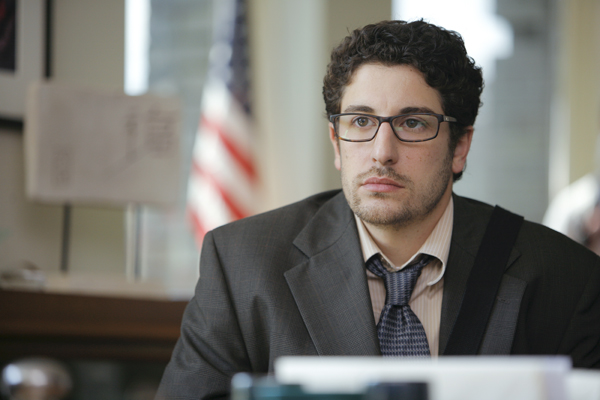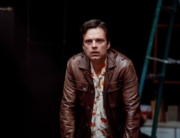The Grassroots filmmakers hope their movie will be a call to citizen participation, and it has been touring college campuses to stir up post-Occupy Wall Street—or Tea Party—involvement. From the opening credit that “most of this is true,” its portrait of shoe leather political organizing pre-social media is lively, but seems more enjoyably quaint than inspiring. (Phil Campbell’s memoir of his 2001 experience is being reissued under the movie title.)
Behind the opening credits, a polar bear–costumed guy strolls through Seattle’s misty cityscape just before Phil (Jason Biggs) is made extinct at an alternative newspaper. Now unemployed, Phil’s first comforted by his girlfriend, Emily (Lauren Ambrose), though she’s just received a promotion at the same paper, and then distracted by his cranky, fast-talking friend Grant Cogswell (Joel David Moore). Grant has taken off his polar bear outfit and decided to leave fringe protests to directly take on the city’s transportation policies by running for city council. (The two met amidst the chaos of the infamous 1999 Battle in Seattle protest against the World Trade Organization.)
For years, Grant has been fervently convinced that the current plan for street-level light rail was a disruptive and costly real estate grab compared to expanding the one-and-half mile, two-station Seattle Center Monorail system, originally built for the 1962 Century 21 World’s Fair. (As a former transportation planner, I think the differences in transit options could have been helped through maps and graphics to rationalize Grant’s rants and rails against traffic.) He enlists Phil in his mission: “It’s your destiny to help me.”
But unlike the classic elitist establishment enemy in Mr. Smith Goes to Washington, the incumbent chair of the council’s transportation committee is held by one of Seattle’s few African-American elected officials, Richard McIver (Cedric the Entertainer, in a non-comedic role), a genial, if typically glad-handing politician. Phil and Gus discover that even folks they presumed would be their natural constituency, including Monorail advocates and labor unions, prefer to stick with an incumbent. From their informal campaign headquarters at an indie coffee shop, they amusingly scramble to learn retail politics—begging for volunteers, mailing lists, and money. (Lessons similarly learned by producer and former California Congressman Michael Huffington, as well as several friends of mine in local races.) Even though they’ve both worked for newspapers, and receive advice from a bemused old hand political reporter (Christopher McDonald), they struggle to grab media attention.
Surprisingly, the emotional heart of the film is not the (suspenseful) election results, but when Grant rallies his troops after he’s watched in tears the World Trade Center collapse two weeks before the primary. Reminiscent of Jon Stewart’s defense of returning to comedy after 9/11, he movingly offers an alternative to Henry V’s Saint Crispin’s speech. He eloquently speaks against war and vengeance, and for civic participation in democracy. As Grant’s candidacy unexpectedly advances from the primary to the general election, Moore—in his best, and most noticeable, film performance—convincingly matures from a near-crazy obsessive to a more practical pol girding for compromise.
But after the chuckles about nighttime forays illegally planting lawn signs in prime sites around town, the epilogue on what happened to the campaign leaders makes this a disappointing downer lesson about amateurs who get discouraged after a few months and don’t continue in community activism. Their idealistic high spirits pale compared to the real nitty-gritty David vs. Goliath in Street Fight (2005) that documented Cory Booker’s first run for Newark mayor against a slimier opponent. Even the satire in TV’s Parks and Recreation offers more substantive lessons about stick-to-itiveness in local civic affairs. The gap between promise and delivery that the film avoids is ironically reinforced in the promotional montage of monorail systems around the world, seen alongside the closing credits, though it curiously leaves out the classic 1993 “Marge vs. the Monorail” episode of The Simpsons, written by Conan O’Brien, that mocked this transit future as a con from the past.

















Leave A Comment